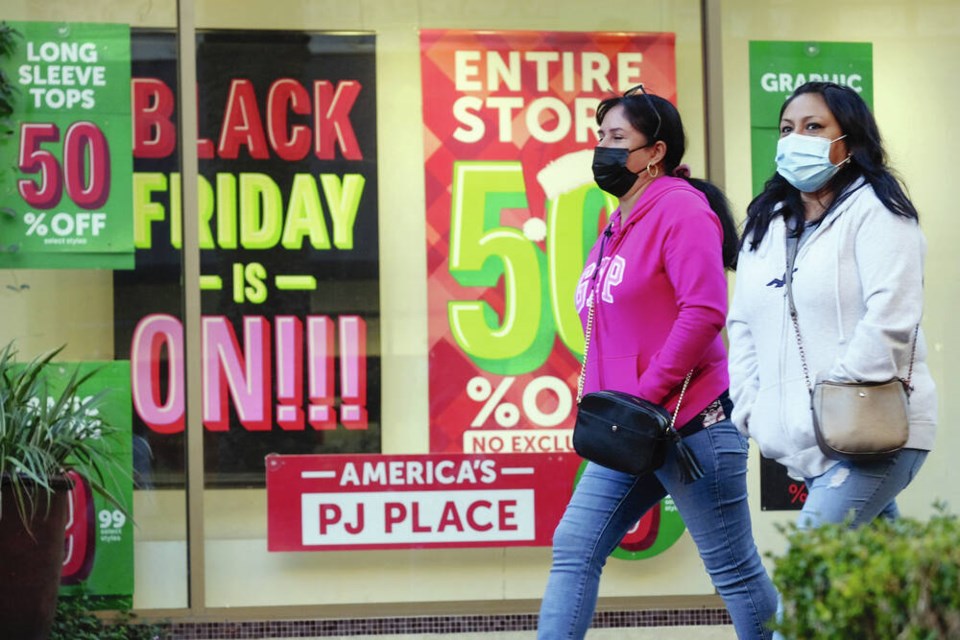I still don’t get Black Friday, not in Canada, anyway.
It was OK when it was just a U.S. phenomenon, with all those videos of Americans Behaving Badly.
Typical was a recording of Arkansas shoppers jostling and squealing like hogs at the trough as they scrambled for $2 waffle makers, with one customer unaware — or not caring — that she was losing her pants in the process.
In Philadelphia, a woman used a stun gun on another as they duked it out in a mall. In Los Angeles, 15 people, including children, were pepper-sprayed during a fight for an Xbox. A Texas man stomped an elderly woman as he tore a television from her hands. YouTube offered compilations of Black Friday brawls. There was a running casualty tally at BlackFridayDeathCount.com.
Pious Canadians, always happy to feel smugly superior, lapped it up.
Except then the Black Friday phenomenon spilled into the Great White North, and it turned out we were just as capable as our neighbours of going all Lord of the Flies on each other if you dangled a $12 toaster in front of our faces.
And, to repeat, Black Friday in Canada doesn’t make sense anyway. The sales are built around the extended long weekend of American Thanksgiving, a holiday that we don’t celebrate.
Where Americans get the day off, Canadians have to log on to Amazon when the boss isn’t looking.
So why, then, did our retailers adopt Black Friday? Self-defence. They were forced to respond as increases in duty-free limits and the emergence of online shopping sent consumer dollars flooding south.
The rise of online shopping is, in fact, one reason Black Friday violence has dipped lately. Would-be buyers can only stab their keyboards, not each other, when racing to buy the last Peace on Earth ornament on the cyber-shelf.
The attractions of online shopping are obvious. You don’t have to leave home. Don’t have to risk catching COVID from strangers. Don’t have to put on pants.
The question is, when you do shop online, where do you buy? Is it from the local merchant who pays local taxes and employs local people, who also pay taxes and contribute to the local economy, or do you just shovel your money out of the country, never to be seen again?
OK, we get it. Sometimes the savings from shopping foreign can be too good to pass up. Choosing not to squeeze every dollar out of a paycheque (or a pension cheque) is a luxury that many can’t afford. Indeed, it’s not like merchants don’t do the same thing; retailers that order their stock from China and advertise on social media can’t complain when their erstwhile customers go cross-border shopping, too.
The problem is that, at some point, we are all going to save so much money that we go broke. No matter how we justify it, pouring money out of our economy has consequences, diminishing our ability to pay for everything from hospitals and schools to parks and pickleball.
Bruce Williams, the CEO of the Greater Victoria Chamber of Commerce, speaks of a hierarchy. A big-box chain that employs local people does more for the local economy than an over-the-horizon outfit, but a locally owned business, one that keep its profits here and supports local causes (look at the sponsors’ names on your charity-event T-shirts) is even better. “Ask yourself, how local is your purchase,” he says.
“Anything you can find online you can buy locally, with a few exceptions,” Williams says. OK, maybe not pineapples. But the most commonly ordered items, like books and clothing? If you’re having trouble sourcing something, check the directory at victoriachamber.ca, which sorts businesses by category.
That’s really the problem, though, isn’t it? We all know where to find stuff. We also know, at some level, that we collectively suffer when local businesses go dark and the money they spend and the jobs they provide vanish with them.
It’s just that we have trouble remembering those businesses and jobs, or the nice retailer who sponsored your kid’s team, or the $25.5 billion in taxes that the province will devote to health care this year, or the $8 million that the City of Victoria will spend on paving and potholes, when we can keep an extra seven bucks in our pockets by having a waffle maker shipped here from who knows where.
>>> To comment on this article, write a letter to the editor: [email protected]

